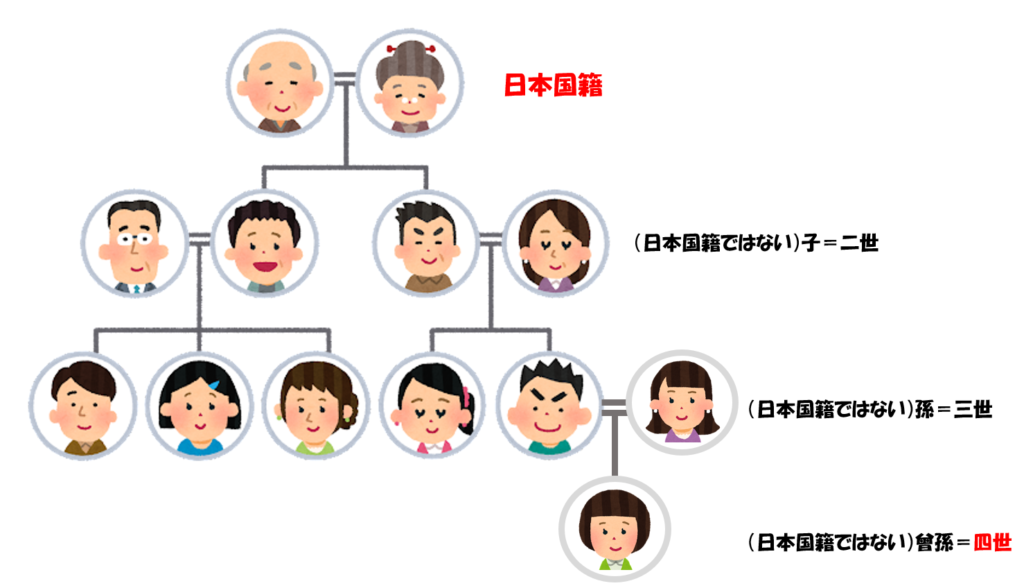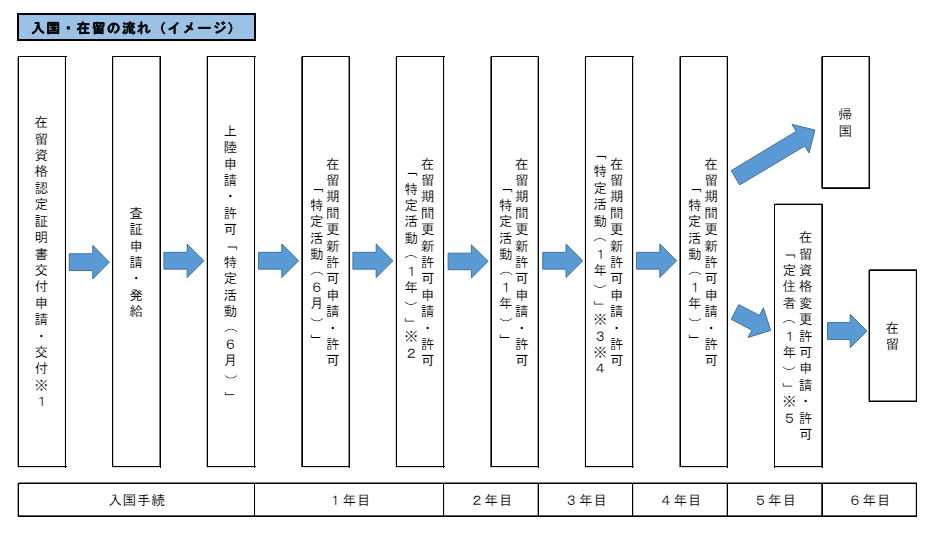
Some Japanese person may be interested in learning about Japan when they discover that their “roots” are in Japan. Under the Japanese visa system, children (second generation) and grandchildren (third generation) of Japanese nationals could come to Japan with the status of “Spouse or Child of Japanese National(日本人の配偶者等)” or “Long Term Resident(定住者)”. Furthermore, fourth-generation descendants of Japanese nationals may also come to Japan with the status of residence of “Designated Activities(特定活動)” for the purpose of gaining a better understanding of Japanese culture and lifestyle.
In this section, we will explain the status of residence for fourth-generation Japanese who wish to deepen their understanding of Japan.
▶Reference:Immigration Service Agency「System for further acceptance of fourth-generation Japanese」
Who are the “Fourth-generation Japanese”?

The term “Fourth-generation Japanese” applies to those whose great-grandparents were Japanese. Among them, there are requirements such as Japanese language proficiency for those who can use this system.
About the person who corresponds to “the fourth generation Japanese”
The ” fourth-generation Japanese” are those who have (former) Japanese great-grandparents.
The children of the great-grandparents (who are not Japanese citizens) are the second generation Japanese, the grandchildren are the third generation, and the children of the third generation are the fourth generation.
An example would be the family line of a person who moved abroad and then changed his or her nationality from Japanese to foreign.

Who can apply for “Designated Activities (Fourth Generation Japanese)”?
The “Designated Activities (Fourth Generation Japanese)” is not open to all fourth-generation Japanese. There are age restrictions and language proficiency requirements.
- Between 18 and 35 years old
- Japanese level equivalent to JLPT N5 or higher
- Must be in good health
- No criminal record
In addition, the cost of your stay in Japan and the cost of returning home must be secured. If you plan to work in Japan and have a job offer, you may declare that as your estimated expenses for your stay.
If you have family members (spouse or children if married), they are not allowed to accompany you. If you wish to come to Japan with them, you cannot bring them with you unless you meet the requirements for another status of residence.
Japanese Language Proficiency
In order to apply for “Designated Activities (Fourth Generation Japanese)”, you must have studied Japanese to some degree.
The required levels are as follows
“To be able to understand basic Japanese” is equivalent to JLPT N4, and “to be able to understand basic Japanese to some extent” is equivalent to JLPT N5. If you are using this system to re-enter Japan, you need to have at least N4, and if you are using this system for the first time, you need to have about N5.
In addition, applicants between the ages of 31 and 35 years old must have Japanese language proficiency equivalent to N3.
The term “examination” refers to “the Japanese Language Proficiency Test(日本語能力試験) N5 or higher”, “the J.TEST Practical Japanese(J.TEST Practical Japanese conducted by the Association for Testing Japanese as a Foreign Language((J.TEST実用日本語検定)(特定非営利活動法人日本語検定協会が実施するJ.TEST実用日本語検定)),F-G level test 250 points or higher”, and “the Japanese NAT-TEST(Japanese NAT-TEST conducted by Professional Education Publications, Inc.)( (日本語NAT-TEST(株式会社専門教育出版が実施する日本語NAT-TEST))Level 5 or higher” are applicable.
The term “certified by other means” means that the applicant has been educated for at least one year in a school (excluding kindergartens) as stipulated in Article 1 of the School Education Law(学校教育法).
What activities can I do under the “Designated Activities (Fourth Generation Japanese )” ?

Under the “Designated Activities (Fourth Generation Japanese )”, you can come to Japan for the purpose of understanding the Japanese culture and lifestyle. They can also work to earn money for their activities and living expenses.
Can also work
Under this program, you may engage in activities for the purpose of understanding Japanese culture and lifestyle, etc. for up to 5 years. For example, they can stay in Japan for the purpose of “learning Japanese language”, “learning Japanese culture”, “working”, or “participating in local government activities or exchange meetings with local residents“.
However, “work” is permitted as long as it is necessary for the purpose of staying in Japan to learn about Japanese culture. In other words, simply entering Japan to work as a migrant without interacting with Japanese people is not permitted.
May spend up to 5 years in Japan, but must improve Japanese for renewal
This program allows for a maximum of five years of residency.
In principle, a six-month period of stay is granted at the time of entry into Japan, but can be renewed for up to five years. If you wish to stay in Japan for more than one year (by the time of your second renewal), you must pass a test equivalent to JLPT N4 or higher. In addition, if you wish to stay in Japan for more than 3 years, you must have passed a test equivalent to JLPT N3 or higher.
After five years of stay under this program, it is possible to change the status of residence to “Permanent Resident” if certain requirements are met. The “Permanent Resident” status allows the holder to work and bring family members with him/her. It is also possible to renew the period of stay.
In addition, you must also enroll in Japan’s National Health Insurance(国民健康保険). If you are working, the amount of taxation depends on your income, but you must pay insurance premiums to renew your period of stay.

▶Source:Immigration Service Agency「System for further acceptance of fourth-generation Japanese」
About the “Fourth Generation Japanese Acceptance Supporters(日系四世受入れサポーター)”

Under this program, fourth-generation Japanese must engage in activities to learn Japanese culture, etc. during their stay in Japan for a maximum of five years. Since they will be living in an unfamiliar environment, they are required to have someone to support them in their activities and daily life so that they can smoothly fulfill their objectives.
The people who provide this support are called “Fourth Generation Japanese Acceptance Supporters” in this program. Supporters can be individuals such as relatives, host families, or employers of the fourth generation Japanese, or non-profit organizations that are active in international exchange or service to the local community. These supporters provide support at no cost.
The organizations that are currently offering the “Fourth Generation Japanese Acceptance Supporter Program” are listed here.
Summary of Requirements for Designated Activities (Fourth Generation Japanese)

The “Designated Activities” that the fourth-generation Japanese can apply for are those who meet the following conditions.
| Item | Contents |
|---|---|
| Purpose of Entry | Activities aimed at understanding Japanese culture and the general way of life in Japan Not to have already stayed in Japan for a total of 5 years under the program. |
| Status | Must be a fourth-generation Japanese. To find out if you are a “fourth-generation Japanese” please see Who is a “fourth-generation Japanese “?(「日系4世」誰のこと)? |
| Age | 18 to 3 years old |
| Behavior | No criminal record in the applicant’s country of nationality or country of residence prior to entering Japan. |
| Japanese Language Proficiency | Have Japanese language proficiency equivalent to or higher than age-appropriate Japanese language proficiency (N5 to N3) at the time of entry into Japan. |
| Livelihood maintenance | The applicant’s livelihood after entering the country must be secured, including savings and the prospect of employment after entering the country. |
| Travel expenses for a return trip | Travel expenses for returning home must be secured. |
| Health | Be in good health Intend to purchase medical insurance |
| Accompanying family members | No family members can accompany you. |
If you have roots in Japan, you may be able to take advantage of this program as if you were on a working holiday. Even if you do not have a job lined up like a working visa or do not intend to attend school like a student visa, you will have the opportunity to stay in Japan for a long period of time and experience the country. Although there is a high hurdle to take advantage of this system, I believe that it is a very good opportunity to learn about your roots.


